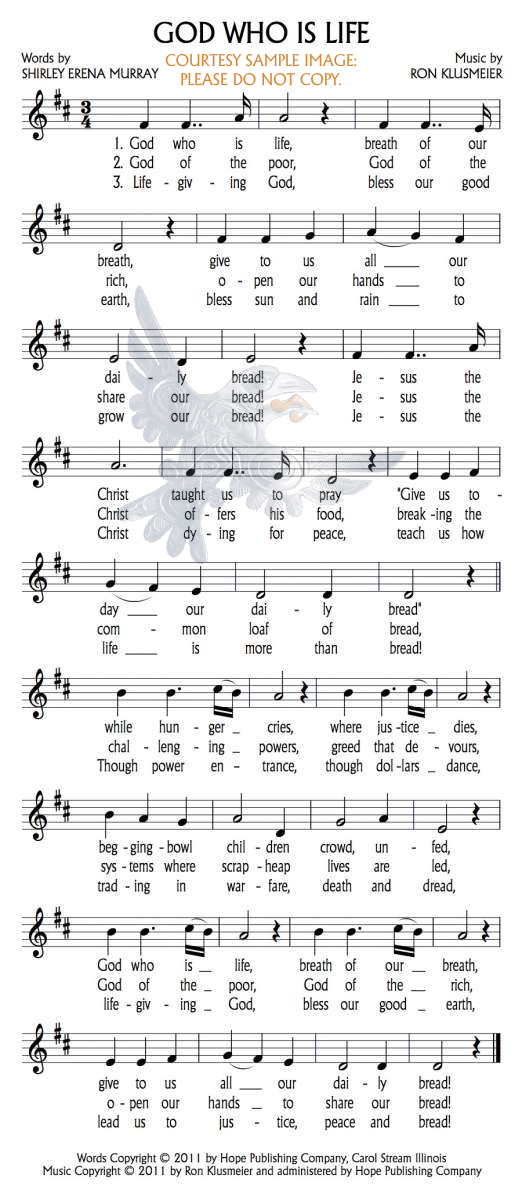God Who Is Life
Music by Ron KlusmeierWords by Shirley Erena Murray
Tune Name: STEWART•AB

Lyrics as Poetry
God who is life, breath of our breath,
give to us all our daily bread!
Jesus the Christ taught us to pray
“Give us today our daily bread”
while hunger cries,
where justice dies,
begging-bowl children crowd, unfed,
God who is life, breath of our breath,
give to us all our daily bread!God of the poor, God of the rich,
open our hands to share our bread!
Jesus the Christ offers his food,
breaking the common loaf of bread,
challenging powers,
greed that devours,
systems where scrapheap lives are led,
God of the poor, God of the rich,
open our hands to share our bread!Lifegiving God, bless our good earth,
bless sun and rain to grow our bread!
Jesus the Christ, dying for peace,
teach us how life is more than bread!
Though power entrance,
though dollars dance,
trading in warfare, death and dread,
lifegiving God, bless our good earth,
lead us to justice, peace and bread!
Words by
Shirley Erena MurrayCopyright © 2011 by Hope Publishing Company
Carol Stream, Illinois • USA
Audio Sample for
”God Who Is Life”
One verse played on piano
Scripture References
- Genesis 1:29-31
- Exodus 16:1-12
- Deuteronomy 8
- Deuteronomy 26:1-13
- Isaiah 55:8-12
- Matthew 6:7-13
- John 6:1-14
- John 13:31-35
- John 15:8-12
- John 21:15-17
- James 2:14-19
Season, Theme
or Subject
- Agriculture
- Bread
- Care, Caring
- Compassion
- Creation∶ care of
- Earth, Earth Day
- Ecology
- Environment (care of)
- Farming
- Food
- Grace
- Harvest
- Hunger, Hungry
- Justice, Human Rights
- Love∶ God's
- Love∶ living love
- Mission
- Nature
- Neighbour
- Poverty
- Share, Sharing
- Stewardship
- Suffering
- Sustenance
- Wholeness
- World Food Day
Presentation Suggestions
Not yet available for this title. Contact us if you are a subscriber (or purchaser of this title) and need this item.
Projection Images
Not yet available for this title. Contact us if you are a subscriber (or purchaser of this title) and need this item.
Accompaniment Recordings
Not yet available for this title. Contact us if you are a subscriber (or purchaser of this title) and need this item.
-
Subscribe To All Titles
unlimited annual access to everything on this site
-
Purchase
This Title
unlimited access to all versions of this title
-
unlimited access to an individual version of this title
Purchasers and Subscribers
Click links below to download your versions.
Versions Available for This Title
Melody Line Versions (includes transposing instruments)
-
Melody Line: 'C' Instrument or Vocal
-
Melody Line: 'C' Instrument 8va
-
Melody Line: Bass Clef 'C' Instrument
-
Melody Line: Alto Clef Instrument
-
Melody Line: ‘Bb’ Instrument
-
Melody Line: ‘Eb’ Instrument
-
Melody Line: ‘F’ Instrument (high)
-
Melody Line: ‘F’ Instrument (low)
Piano Versions
Hymn-style Vocal Harmonizations (accompany with any piano versions)
-
Hymn-style: SATB voices
Guitar Chords & Bass Progressions
-
Guitar & Bass: Full chords in keyboard key
-
Guitar: Transposed capo chords
Comments About Song
Comment by
SHIRLEY ERENA MURRAY
from her book
“A Place at the Table” (#16):
“The World Council of Churches invited hymns and prayers for the Assembly in Busan, 2013 on the theme: ‘God of life, lead us to justice and peace’. I wrote this as a contribution while in correspondence with Ron Klusmeier, and he replied with this immediate setting. It has proved useful in terms of imagery and theme for his impressive Tour of a Lifetime, in which he crossed the whole of Canada raising funds for the Canadian Foodgrains Bank and creating singing workshops of his music as he went. I am immensely happy to have been connected to this magnificent effort.”
A Place at the Table
is published by:Hope Publishing Company
Carol Stream, IL USA
A Reflection by hymnwriter
WALTER FARQUHARSON
“Give me this day my daily bread.”
I imagine that most who read this reflection, or sing this hymn by Shirley Erena Murray, are stopped short by this one-line prayer. It feels wrong. By biblical standards and the teaching of Jesus, it is wrong, wrong-minded, off track, a denial of life as God intended.
When we step away from our familiarity with “Our father…”, the prayer Jesus taught, an amazing truth faces us. “Your name, O God, be honoured. Your rule come. Your will be done on earth.” This first part of the prayer speaks of honouring God and speaks generally of God’s rule and of God’s will. Then the language abruptly changes. “Give us, this day, our daily bread.” As this prayer takes flesh amongst us, God is honoured. We give evidence of our trust in God and in the reality that when we all have bread (food) to share, the kingdom comes closer and God’s will is seen to be done. Just as in the next petition forgiveness carries a call to be forgiving, so our having bread implies sharing that bread. When one of our family is denied food, Christ is denied food and talk of his kingdom or kindom is made a mockery.
As a society, and as a church, we have, to a great extent, forgotten that “Give us this day our daily bread” stands not only as a central part of the prayer Jesus taught his followers to pray but as a central commandment of Christian practice.
There will not be world peace as long as millions lack food security. There will not be justice until poverty has been eradicated and all have access to what is necessary to sustain life and health, and when all have access to education and opportunity that will enable them to participate in a world that increasingly sees others as kinfolk. Surely it is rank hypocrisy when we pray that such a new day come when in our hearts and minds we cannot see it as possibility – and as our corporate mission. The issue is not one of party politics but it is one of public commitment, compassion, and intentionality.
As I first listened to “God Who Is Life”, two phrases particularly demanded my attention. They were “begging-bowl children” and “scrapheap lives”. They have no names. In the eyes of many they are denied, they simply do not exist or they are written off as deserving their fate – because of what they or their parents, or someone, did to them or failed to do for them. Jesus of the gospels sees people regularly not seen, not recognized as having worth, not seen as children of God, loving and capable of loving. Jesus of the gospels calls us, his followers, to do the same, to truly see the begging bowl children and the scrap heap people with the same compassion and care that defined his being.
It was in the Philippines on a visit to partner churches that I saw what before had been a newsclip on TV or a paragraph in an article on world hunger and health. For me, as a person of privilege living in a privileged nation, it was almost beyond belief to see whole family groups from elderly grandparents to small toddlers picking their way through immense garbage dumps to collect anything, anything that could be salvaged and sold. Fires smouldered throughout the dump, the place was smoky and the garbage they maneuvered their way through would have harbored all sorts of toxins and hazards. What I saw there I could have seen in so many places in the world. Even in my own wealthy country, too many children and adults check dumpsters for food. Give us this day our daily bread.
The community I live in has an active community drama group committed to producing an annual dinner theatre. Most are billed as dramatic comedies. Most carry messages for living and often uncover uncomfortable exposure of realities we’d rather forget. A few years ago, our play, written by a local teacher and playwright, was entitled “The Scrap Heap Kids”. In this instance the so-called scrap heap kids were a brother and sister brought into the community as foster children by a local woman. Some within the community feared these children might corrupt the children of the community – there was so much not known about them! The kids were befriended by an old bachelor considered by most, including the child protection worker, as a less than suitable influence. A blizzard, a search for missing children, some surprising acts of heroism, hints of romance, all combine to open minds and hearts of many. Conversations among playgoers highlighted the impact of the title itself and the labelling of the scrapheap kids.
Whether on the global scene or on our doorstep, the recognition that we can see some children as dispensable, as statistics, as problematic, is sobering. It is a call to repentance and reformation.
“Though power entrance,
though dollars dance,
trading in warfare, death and dread,
life-giving God, bless our good earth,
lead us to justice, peace and bread!”
Give us this day our daily bread …
An Activity: This might be done over a few days. Give attention to part one over two or three days, then turn to part two for two or three days.
Part One: Envision children you know (grandchildren, nephews or nieces, from your church or community). See some of them in an immense smouldering garbage dump picking over garbage in search of saleable items. See others sitting with a begging bowl at the door of your shopping mall or church, arena or favourite eating place. What is it like seeing them there? What is it like seeing how they are seen (or not seen) by people around them? What is it like seeing how they are treated?
Part Two: Write a letter to a child – being sure to give the child a name and to have a picture in your mind of the child’s age and appearance etc.). Begin your letter: “Dear [name], I’m sorry that you’re hungry.” Continue your letter saying whatever you want or feel compelled to say.
Part Three: Send a letter to your local church or to a political leader or representative expressing concern and calling for action on hunger and hunger issues globally, nationally or locally.